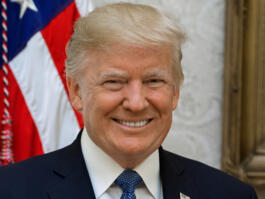Party Affiliation Dictates Responses to ‘Chinese Virus’
Voters are closely divided over how the government has responded so far to the coronavirus threat, but, even in a time of national emergency, it appears that party affiliation overrides all.

Voters are closely divided over how the government has responded so far to the coronavirus threat, but, even in a time of national emergency, it appears that party affiliation overrides all.

One-in-four voters are prepared already to postpone the November presidential election – for the first time in U.S. history - if the coronavirus threat continues. Support is much higher for delaying upcoming primaries.

Americans strongly support the government’s travel bans and school closings in response to the coronavirus threat, but one-in-four think panic, not reason, is driving some decisions.

Given China’s silence and secrecy about the outbreak of the coronavirus virus, a sizable number of voters here think the Asian giant needs to pay up for some of the losses the virus has caused. But there’s little war talk so far.

Americans are only slightly more concerned about their personal safety as the coronavirus pandemic grows, but they’re noticeably less confident that the U.S. health care system can deal with the problem.

Democrats think their party should be more like Joe Biden than Bernie Sanders but aren’t calling for Sanders to quit the presidential race just yet. They fully expect Sanders to endorse Biden if the former vice president wins their party’s nomination, though.

Voters are evenly divided over whether Obamacare should stay or go now that the U.S. Supreme Court has agreed to hear a case challenging the constitutionality of what’s left of the health care law.

The federal government plans to give the coronavirus vaccine to elderly Americans for free. Voters strongly agree with that plan.

Democratic voters are closely divided over whether Tulsi Gabbard should be included in their party’s next presidential debate, but they overwhelmingly put their money on Joe Biden to be the ultimate nominee.

Senate Democratic leader Charles Schumer got himself in hot water last week with a public attack on two U.S. Supreme Court justices. While voters see judges as political creatures, most disapprove of threatening judges by name.

Voters expect Joe Biden to easily beat Bernie Sanders for the Democratic presidential nomination and would opt for Biden over President Trump if the general election were held today.

Voters are less convinced these days that the U.S. Supreme Court is driven by politics despite Justice Sonia Sotomayor’s recent accusation that some of her fellow justices have a pro-Trump bias. But voters still strongly believe the members of the high court should keep their political views to themselves.

Like most everything else in America today, views of the coronavirus and the government response to it are heavily colored by politics. Democrats are most likely to see the new virus as a threat and to criticize the government’s response. Republicans see an anti-Trump agenda at work.

As Super Tuesday dawns, Joe Biden has jumped back ahead nationally in the race for the Democratic presidential nomination, with Bernie Sanders in second. Despite spending over half-a-billion dollars on campaign advertising, Michael Bloomberg has faded to third.

Despite Bernie Sanders’ front-runner status in the race for the Democratic presidential nomination, voters aren’t showing more enthusiasm for socialism. Democrats remain more receptive than other voters, however.

So much for bipartisanship. Most Republicans are finally happy with the job their representatives in Congress are doing, while Democrats are even happier with theirs than they have been in the past.

President Trump would KO Democrat front-runner Bernie Sanders if the 2020 presidential election were held today.

With 78-year-old Bernie Sanders’ surge to the lead in the race for the 2020 Democratic presidential nomination, questions are being raised about his health, especially following a heart attack several months ago. A sizable majority of voters says a candidate’s health is an important voting issue, and most think major presidential candidates should make their medical records public.

Some Democrats were unhappy with President Trump’s recent pardoning of several convicted felons, but voters are closely divided over whether Congress should be able to stop those pardons.

Pete Buttigieg, the first openly gay major presidential candidate, is one of the early leaders in the race for this year’s Democratic nomination. Most voters say they have no problem with electing a gay president but remain less sure that others they know agree.